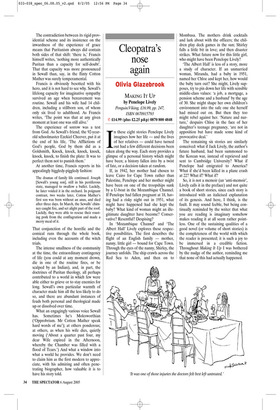Cleopatra’s nose again
Olivia Glazebrook
MAKING IT UP by Penelope Lively Penguin/Viking, £16.99, pp. 247, ISBN 0670915793 ✆ £14.99 (plus £2.25 p&p) 0870 800 4848 In these eight stories Penelope Lively imagines how her life — and the lives of her relatives — could have turned out had a few different decisions been taken along the way. Each story provides a glimpse of a personal history which might have been; a history fallen into by a twist of fate, or a decision taken at random.
If, in 1942, her mother had chosen to leave Cairo for Cape Town rather than Palestine, Penelope and her mother might have been on one of the troopships sunk by a U-boat in the Mozambique Channel. If Penelope had fallen pregnant at 18, having had a risky night out in 1951, what might have happened had she kept the baby? What kind of woman might an illegitimate daughter have become? Conservative? Resentful? Despising?
In ‘Mozambique Channel’ and ‘The Albert Hall’ Lively explores these respective possibilities. The first describes the flight of an English family — mother, nanny, little girl — bound for Cape Town. Through the eyes of the nanny, Shirley, the journey unfolds. The ship crawls across the Red Sea to Aden, and then on to Mombasa. The mothers drink cocktails and lark about with the officers; the children play deck games in the sun; Shirley falls a little bit in love; and then disaster strikes. What future now for this little girl, who might have been Penelope Lively?
‘The Albert Hall’ is less of a story, more a study of character. If an unmarried woman, Miranda, had a baby in 1951, named her Chloe and kept her, how would the baby turn out? She might, Lively supposes, try to pin down her life with sensible middle-class values: ‘a job, a mortgage, a pension scheme and a husband’ by the age of 30. She might shape her own children’s environment into the safe one she herself had missed out on. But then they too might rebel against her. ‘Nature and nurture,’ despairs Chloe in the face of her daughter’s teenage pregnancy, ‘are not in apposition but have made some kind of provocative deal.’ The remaining six stories are similarly conceived: what if Jack Lively, the author’s future husband, had been summoned to the Korean war, instead of reprieved and sent to Cambridge University? What if Penelope had emigrated to America? What if she’d been killed in a plane crash at 22? What if? What if?
So, it is not a memoir (an ‘anti-memoir’, Lively calls it in the preface) and not quite a book of short stories, since each story is introduced with an italicised explanation of its genesis. And here, I think, is the fault. It may sound feeble, but being continually reminded by the writer that what you are reading is imaginary somehow makes reading it at all seem rather pointless. One of the sustaining qualities of a good novel (or volume of short stories) is the completeness of the world with which the reader is presented; it is such a joy to be immersed in a credible fiction. Throughout Making It Up I was bothered by the nudge of the author, reminding me that none of this had actually happened.











































 Previous page
Previous page